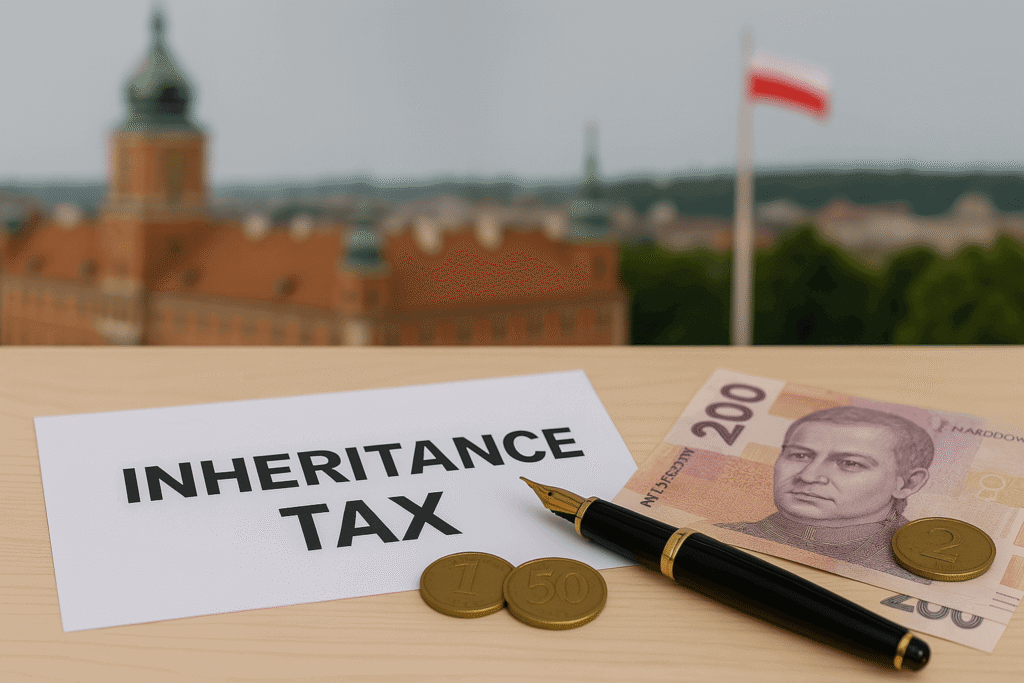If you own assets in Poland or are expected to inherit assets in cities like Warsaw or Krakow, it’s important to understand the legal and tax implications involved in the inheritance process. Understanding the Polish tax and which category you fall under is critical as Poland offers tax exemptions for close family under certain amounts. Although inheritance and gift taxes are still likely to apply for distant relatives, non-residents, or large amounts.
In Poland, there are rules for taxing inheritances depending on the relationship of the deceased and the heir and the value of the inheritance. Tax rates can reach up to 20% of the inheritance. Early understanding of local law, and early planning of wills, residency, and gifts during lifetime can significantly reduce exposure to tax payments when transferring assets between generations. Beyond that, inheritance tax planning can prevent legal disputes, delays in the inheritance process, and unexpected demands from various authorities.
What’s the Difference Between Inheritance Tax and Estate Tax?
- Estate Tax – Imposed on the deceased’s assets before they are transferred to the heirs.
- Inheritance Tax – Applies to all assets received by the heir.
Inheritance Tax in Poland– What You Need to Know?
In Poland, follows a progressive tax system based on the relationship with the deceased and the heirs. The tax will apply if the deceased or the heir was a resident of Poland or if the assets of the inherited are in Poland. – Even if the heir is not a resident of Poland, they still need to pay taxes if the deceased was Polish or if the assets such as property is in Poland.
If the heir is a resident of Poland and is inheriting assets from abroad it must be reported. There could be potential foreign taxes depending on if the country has a treaty with Poland.
Tax Rates
- Group 1 – (Immediate Family) 3% – 7%
- Group 2 – (Extended Family) 7% – 12%
- Group 3 – (Unrelated Family) 12% – 20%
Exemptions and Relief
Immediate family like spouse, children, parents, and siblings can get full exemption if they declare the inheritance within 6 months, through Form SD-Z2. While other groups can fall under a tax-free threshold.
Tax-free amounts
- PLN 9,637 – for persons falling into tax group I.
- PLN 7,276 – for persons falling into tax group II.
- PLN 4902 – for persons falling into tax group III.
Gift Tax
Gift tax falls under the same rules as inheritance tax, including the same progressive tax rates. Gift from close family is offered exemptions if reported within the correct timeline.
Inheritance Taxation in Israel Compared to Poland
In Israel, unlike Poland, there is no estate tax or inheritance tax. However, in certain cases, tax may be imposed on the full value of the inheritance received, such as capital gains tax when selling the asset.
The tax treaty between Israel and Poland includes provisions that can prevent double taxation, but it’s important to plan the reporting and filing accurately to avoid double payment.
To read the Israeli-Poland tax treaty in English, click here.
Making a Will in Poland – The Key to Tax Savings and Dispute Prevention
Inheritance doesn’t always transfer smoothly to the heirs. Sometimes complex procedural steps are needed to obtain a probate order or permission to realize the assets.
Creating an organized will is not just a matter of personal desire; it is an integral part of estate taxation. A detailed will can ensure that assets are transferred smoothly and efficiently to the heirs. The will should include the wishes of the deceased but must also be adapted to the requirements of the law so that its validity is not compromised. In Poland, children or spouse, or even parent sometime are entitled to inherit the deceased assets even if the deceased made a will and it excludes them from it. If the deceased doesn’t have a valid will, Polish law will determine the distribution among the legal heirs.
If you own assets in Poland, our recommendation is to make a will to ensure that the transfer of assets is done as smoothly as possible. A will can prevent misunderstandings or lengthy legal processes and ensure that the process proceeds in an orderly manner even after the death of the deceased.
Received an Inheritance in Poland? 7 Steps for Proper Realization of Inheritance from Poland
1. Clarification of Factual and Legal Background
First, check the type of asset that is to be inherited, its location, the identity and status of the heirs, the value of the asset, and more.
2. Checking the Timing and Location of Inheritance Realization
Consider whether it’s advisable to realize the asset now and if so, where is it better to realize it – in Poland or in Israel?
3. Regulatory and Banking Aspects
It is recommended to check the costs of money transfers, whether there is a need to open an account in Poland or another country for the purpose of transferring funds, what approvals are required, etc.
4. Planning the Asset Transfer
Consider whether to transfer the asset itself or its proceeds, and what are the implications in terms of tax, exemptions, deductions, etc.
5. Avoiding Double Taxation
In light of the existence of a double taxation prevention treaty– it is recommended to check whether there is a mechanism for crediting tax paid in Poland against tax liability in Israel. Make sure that the reporting is done correctly and accurately to avoid double payment.
6. Checking the Future Effects on the Asset
It is recommended to examine the future effects on the asset – for example, a future sale of the asset will often be subject to capital gains tax in Israel as well.
7. Transferring the Asset to Israel
Performing all necessary actions, submitting documents, handling matters with banks in Poland and Israel, and executing the asset transfer.
How Can We Help?
The goal is to transfer the inheritance to heirs in Israel in the most tax-efficient way, while addressing legal issues in Israel and Poland and issues related to banking and regulation. For example, whether it’s better to realize a certain asset in Poland or transfer it to Israel; how to transfer inheritance funds to a bank account in Israel; how to use various exemptions between heirs; whether to give gifts during lifetime; whether to establish a trust, and more. Strategic planning, according to law and tax treaties, is essential to minimize tax liabilities.
Nimrod Yaron & Co. has extensive experience in personally and professionally accompanying Israelis with assets or inheritances in many countries around the world, including Poland – from the first stage of planning, through dealing with authorities in Poland and Israel, to transferring inheritance funds to the heir’s bank account.
We work with all relevant professional entities in Poland and Israel and offer legal solutions both in terms of taxation and banking – tailored to the circumstances of the case.
If you have inherited an asset or wish to bequeath assets in Poland in the future, our team of lawyers specializing in international taxation and inheritance law will be happy to advise you on this matter – contact us for an initial consultation.
Q&A
Do I need to pay tax in Israel on an asset inherited from Poland?
No. There is no inheritance tax in Israel. However, capital gains tax may apply after the sale of the property. It is important to check the recommended date for selling the inherited property.
Why is it important to plan the transfer of assets between generations in advance?
The transfer of assets between generations from abroad is not just a family matter but also a tax and economic issue. Early planning, considering legal issues in Israel and abroad, can save a lot of money and prevent legal complications.
How can the inheritance be realized optimally and save tax?
To realize the inheritance optimally and save unnecessary tax payments, all tax options should be examined, including utilizing exemptions, planning gifts, establishing companies, trust funds, and more.
How can the inheritance tax liability in Poland be reduced?
Through early tax planning, which includes drafting a will, utilizing exemptions, giving gifts during your lifetime, and more, you can significantly reduce your tax liability.
Is it better to give an asset as a gift during lifetime or to bequeath it?
The choice between giving a gift and bequeathing depends on the circumstances of the case. Sometimes a gift will be taxed similarly to an inheritance. Therefore, the legal and tax aspects should be examined before making a decision.
What are the implications in case there is no will?
In the absence of a will, the inheritance will be divided among the legal heirs according to the local inheritance law of Poland.
What documents are required for the process of realizing an inheritance in Poland?
To realize an inheritance in the Poland, documents such as a death certificate, a will (if one exists), copies of the heirs; ID cards, property ownership documents, bank account confirmations, and more are required.
How long does the process of realizing an inheritance in Poland take?
It should be considered that the process of realizing an inheritance in the Poland can take between several months and a year or more, depending on the complexity of the testator’s estate, the number of heirs, the existence of a will, and other factors.









